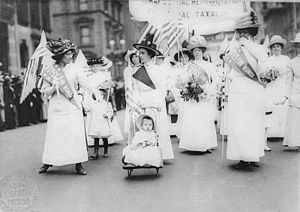Brown Right to Cut Women’s Commission
FEB. 6, 2012
Any time there is a chick-fest at the Capitol, eyes roll. Last week a legislative hearing about women wasn’t the usual love fest of everything woman. This whining group was lobbying to save a state commission from budget cuts, hardly the picture of classic suffragettes.
The governor announced last year that he wanted to dramatically reduce the budget of the California Commission on the Status of Women, which began under his father, Gov. Pat Brown. Many say that the commission has been operating for years more as a spending lobby, than a support group for women and girls.
The women I saw represented every hackneyed feminist movement issue.
Cuts To Women
In his budget proposal, Gov. Jerry Brown said the commission’s administration, legislation, research and information budgets would be reduced from $465,000 to $265,000. While compared to the multi-million-dollar budgets of other agencies, this seems like peanuts. But a great deal of legislator and staff time has been spent on the subject of women. And the state sends its female employees to the commission’s convention every year, slighting the state’s male employees.
Come to think of, why don’t men have a commission?
The joint legislative hearing was held to promote a new report from the California Budget Project titled, “Falling Behind: The Impact of the Great Recession and the Budget Crisis on California’s Women and Their Families.”
Injustices and inequities to women were a focus of the hearing, made up of members of the Assembly Subcommittee No. 1 on Health And Human Services, Budget Committee, and the Senate Human Services Committee at the “Joint Info-Hearing on The Recession and Impact on Women/Families.
Members from the legislative women’s caucus, and representatives from the California Budget Project and the women’s commission, addressed women’s entitlements and “women’s rightful inheritance to realize potential.”
The report concluded that women have been hit harder during this recession, and are not enjoying the fruits of economic recovery the way men are, because of cuts to services that women use: Healthy Families, welfare, CalWorks, CalFresh, Medi-Cal and subsidized child care. The report stated that single mothers and older women “were more likely to live in poverty.”
But if poverty in California is a problem, is it a bigger problem for girls and women? Don’t men and boys suffer from poverty? And why does California have an entire agency dedicated to just women and girls? What about two-parent families living in poverty, undocumented immigrants living in poverty, or single father families?
A Commission Of Women Only
According to its mission statement, “The Commission on the Status of Women, a nonpartisan state agency, works in a culturally inclusive manner to promote equality and justice for all women and girls by advocating on their behalf with the Governor, the Legislature and other public policymakers, and by educating the public in the areas of economic equity including educational equity, access to health care including reproductive choice, violence against women and other key issue areas identified by the Commission as significantly affecting women and girls.”
The interim director’s bio page has a little more detail about what the commission does and the agenda it upholds: “The Commission works to promote equality and justice for all women by advocating on a wide array issues including educational equity, access to health care, LGBT rights, employment discrimination, welfare, reproductive freedom, violence against women, child care, and women in prison.”
I am not clear how the lawmakers can claim with a straight face that women don’t receive equality and justice in California, when it’s the law. In fact, women receive some extra equalities: Title IX, harassment and discrimination protections, paid and unpaid family leave, affirmative action practices, gender non-discrimination protection, gender ratios, gender equity laws and regulations, gender codes and more.
Based on all of the gender protections, the commission has apparently done a great deal of work during the past 40 years, and should be about done by now, unless equality is not the actual goal.
The California Budget Project Report
Jean Ross, responsible for the report and CEO of the California Budget Project, thanked legislators and staff members for the countless hours they devoted to the report. “It truly is an honor to talk about the findings of the report,” Ross said about the bad news she was about to deliver to legislators.
“The California Budget Project engages in independent fiscal and policy analysis and public education with the goal of improving public policies affecting the economic and social well-being of low- and middle-income Californians,” the website states.
At the hearing, Ross said that women have suffered more during this recession, and consequently have found diminished access to state funded higher education, and subsidized health care, childcare and-higher paying jobs.
“Women have not shared equally in job recovery, making only modest employment gains, while men increased,” Ross said. “Men are getting jobs back.” Ross identified the typical jobs held by women as primarily in the public sector: School employees, local government jobs and employees at community colleges.
One common gripe at the hearing was that women still are not paid as much as men. However, if women in the workplace are not paid the same as their male counterparts, is it because of gender discrimination, or because women take more time off from work than men, as many studies have concluded?
Ross’s report claims that California’s budget cuts have diminished women’s access to higher education. However, most education advocates say that African-American males suffer the most from lack of access to higher education, and that women greatly outnumber men in colleges and universities.
The Reality Disconnect
“If you were given the same fiscal constraints as the governor, what would you do?” Sen. Rod Wright, D-Inglewood, asked Ross during the hearing.
“Budgets are about choices,” Ross answered.
“Budgets are about how much money you’ve got,” Wright said. “What would you do?”
Ross replied that if lawmakers hadn’t made some of the choices they had, things might be different.
“Ifs and buts with cherries and nuts,” said Wright to a laughing audience. “We have the money and revenue that we have. The people are not likely to vote for increased taxes. Where do we get the money from?”
Rather than answering, Ross quickly said that her closing statement was done, and encouraged the panel to go on to other witnesses. Ross was clearly among friends on the committee and at the hearing.
The Commission of Women
Made up of legislators and social change policy agitators, the California Commission on the Status of Women’s commissioners include Kafi Blumenfield, wife of Democratic Assemblyman Bob Blumenfield; Asssemblywoman Assemblymember Julia Brownley, D-Woodland Hills; Lupita Cortez Alcala, representing Democratic Superintendent of Public Instruction Tom Torlakson; state Sen. Noreen Evans, D-Napa; Senator Carol Liu, D-Glendale; Assemblywoman Bonnie Lowenthal, D-Long Beach; Assemblywoman Holly Mitchell, D-Los Angeles; state Sen. Gloria Negrete McLeod, D-Chino; and Julie Su, a civil rights lawyer and state labor commissioner.
There is not one Republican on the commission, nor is anyone from the private sector represented.
Describing herself as “an advocate of 19 million women and girls,” Sandy Gleysteen, chairwoman of the Commission on the Status of Women since 2007, lauded the legislative women’s caucus and committee. “We are relieved that you walk these halls,” Gleysteen said. She primarily testified about poor women and women of color, who are facing more cuts to services.
But interestingly, Gleysteen, a former television producer and friend of former California First Lady Maria Shriver, spent more time defending her agency, which is facing closure in June.
Women-Only Agency
The women who were the subject of the report are women who rely on government services. It became apparent during the hearing that the legislators and social activists want to expand social services, not cut them. The prevailing attitude appeared to be that most California women should be using state services, or surely we are not properly caring for our children.
What kind of mother would send a kid to school with a sack lunch instead of opting for a free school lunch? Who would degrade a kid so much by making him wear discount athletic shoes? What kind of mother would require her child to ride a bicycle to school instead of taking public transportation? Oh, the shame. With this group of lawmakers and activists, it’s all about the entitlements.
Several women that I respect and spoke with after the hearing said the report is insulting, and the legislators and commission members who support it are disconnected from reality.
One example of the disconnect can be found in the report – rather, it’s missing from the report. The California Budget Project report did not reveal that the majority of adults onCalWORKS do not meet the program’s work requirements. Adult participants are required to actively look for work, and/or actually work – it’s a welfare-to-work program. Instead, Ross’s report only focused on those cut from the program.
The devil is in the details.
The Department of Social Services has reported that more than 40 percent of adults in child-only welfare cases in the CalWorks program are undocumented immigrants – roughly 133,000 cases out of 300,000 child-only cases. CalWORKS ha approximately 585,000 cases total. These are not my statistics. It’s an issue that needs remedy, not denial.
California has 12 percent of the country’s population, but more than 30 percent of all welfare recipients. Assistance programs and welfare should be designed to promote self-sufficiency among adults who are able to work, and should discourage long-term dependence on government.
These are the issues that should be addressed by women’s groups and female legislators. Empowerment, not entitlement is always the better answer.
Long-term Government Dependence Agenda
“It is difficult to believe that Gov. Jerry Brown wishes to silence the voice of women in his administration while threatening the ability of women to survive and succeed. Yet, in his latest budget proposal, Brown will be eliminating the state commission in June,” the Glendale newspress said.
Discussions addressing the real welfare inequity are difficult to have when media statements such as this one are being made. Welfare has morphed from a legitimate safety net to a way of living. And the majority of California’s legislators are promoting this dependence.
Feminists and women’s special interest groups like the Commission on the Status of Women only serve to set all women back by decades. If indentured servitude and reliance on government is the goal, instead of self-reliance, this commission and the women who support it have succeeded.
“All this does is convince employers not to hire women when they have a choice,” said one Capitol staffer who asked to remain anonymous. “I think the women’s movement has hurt women more than they will ever know.”
Brown needs to cut this commission off at the head.
— Katy Grimes
Related Articles
Come to California Mr. President
Katy Grimes: It’s difficult not to acknowledge President Obama’s latest world tour – he booked the entire Taj Mahal Palace
Assembly committee to look at Leg treatment of women employees
This week, the California State Assembly announced the creation of a new select committee to investigate issues facing women in
California Divorce Invades World
John Seiler: Another California plague is invading the world: our absurd divorce laws. You probably know comedian John Cleese from





